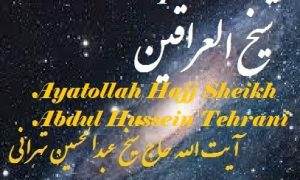In a tablet issued by the name of Sheikh, Hussein Ali Nouri has attacked him and has called him “doubtful ignorant person” and “and “crafty element”! Also, Shoqi Effendi (Baha’s grandson from his daughter side and Abbas Effendi’s successor has repeatedly cursed and insulted Sheikh using words such as “malicious Sheikh”, “rejected in both worlds” and “The one who is being angered greatly”.
Have you ever heard the name of Sheikh Iraqin? Most people who is studying about Baha’ism know him. Consequently, we are going to introduce him:
He is known as Ayatollah Hajj Sheikh Abdul Hussein Tehrani. This great scholar (died in 1286 A.H.) is one of the celebrated jurisconsults in 13th century. When he was residing in Karbala city, a great number of people were imitating him in religious issues[1]. He was one of the pupils of the author of the Jawaher book[2]. The author of the book Jawaher specified religious jurisprudence of 4 pupils. One of whom was Sheikh Abdul Hussein[3]. Such a great man’s speech about Sheikhul Iraqein indicates his high rank in knowledge and religious intelligence. As Ayatollah Mirza Hussein Nouri calls him the most skillful of the researchers.[4]
According to E’temadussaltaneh (the minister of science in Naseri era: Tehrani was a great sage and acceptable by people. He had a remarkable validity among the public and Ottoman government and the rulers of Iraq respected him very much.[5] Naseruddin Shah had assigned him supervising on Iran’s repairs and installations in the holy Shrines such as developing the holy courtyard of the Lord of the martyrs (peace be upon him)[6]. He was quite satisfactory with his supervision on repairing the illuminated dome… and installing golden bricks[7]. In 1274 A.H., Shah commissioned him to repaire the holy tomb of the holy Imams in Karbala, Kazem and Kazemeini and Samara (peace be upon them). During the years 1274 to 1286 A.H. (He died on Ramadan, 22) he was busy doing this job. His personal bookcase in Karbala city was famous for having precious books.[8]
Amir the great trusted Sheikul Araqein[9] and Amir who was of the gemologists consulted him in solving problems[10] in addition to referring the legitimate trials to him[11]. Pointing out referring the legitimate trial to the Excellency Sheikul Araqein by Amir the great, Abbas Eqbal says: His belief towards Sheikh was increasing day by day.[12]” Then, he says narrating a story concerning Amir’s familiarity with Sheikh: After the familiarity, Amir was constantly preaching for Sheikh to such an extent that he became Amir’s counsellor in some difficult affairs.[13] According to Fereydoun Adamiyat: During Amir’s premiership, all legitimate claims had been referred to Sheikh Abdul Hussein and the court. His judgment was definite. Arthure de Gobineau is reminding him with respect. He believes that Sheikh Abdul Hussein is a high ranking jurisconsult and is chaste cool and curious.[14]”
Even, Amir the great appointed Sheikh Abdul Hussein as his successor[15].
It is obvious that for an acute jurisconsult like Sheikul Araqein, it is clear to announce Bab’s claims as null regarding various evidence and reasons such as: Bab’s repentance on Shiraz pulpit, the existence of mistakes in tablets and etc. when Baha was exiled to Iraq, Sheikul Araqein was living in Iraq and observing their bad activities. The Baha’i course specify that the emigrant Babis were stealing shoes, hats, money, garments of Shiite pilgrims in the holy places.[16]
Additionally, riot and murder were splendor among Babis and according to Baha’s sister (Ezzieh Khanom), Baha was meddling with these issues.[17]
[۱] For instance, refer to Abul Qasem Afnan’s remarks, the Baha’i historian, in the highest era…, p. 388 and 390; The Baha’i message magazine, No. 296, July 2004 “The month note”
[۲] Ma’areful Rejal, Sheikh Muhammad Herzuddin, 34/2
[۳] Al-Keram Al-Bararah; Sheikh Agha Bozorg Tehrani713/2; Ma’areful Rejal 35/2.
[۴] Ma’areful Rejal 112/2
[۵] The writings, the manifesto…martyr Sheikh Fedhlullah Nouri, Muhammad Torkaman, p. 449.
[۶] ۴۰-year history of Iran… (Al-ma’atherwal Athar), attempted by Iraj Afshar, 189/1, concerning Sheikh Abdul Hussein, Also refer to Reyhanatul Adab, the great scholar Khiyabani, 329/3.
[۷] Reyhanatul Adab 329/3
[۸] Naseruddin Shah’s newspaper to Khorasan, Ali Naqi Hakimul Mamalek, p. 470.
[۹] Amir the great’s letters in addition to Nawaderul Amir’s epistle, edited by Seyyed Ali
[۱۰] (The biography of the Iranian men, 94/6)
[۱۱] Amir the great and Iran, Adamiyat, p. 308 and 343.
[۱۲] Refer to Amir the great’s documents and letters, ibid, p. 82.
[۱۳] Mirza Taqi Khan Amir the great, p. 168.
[۱۴]Ibid, 168-171
[۱۵] Amir the great and Iran, p. 308 also refer to p. 343 and 103.
[۱۶] The politicians in Qajar period of time, Khan Malek Sasani, Al Davood publishing house, pp. 344-345.
[۱۷] The heavenly food, Ishraq Khawari, Tehran, 1327 S.H. 130/7.






